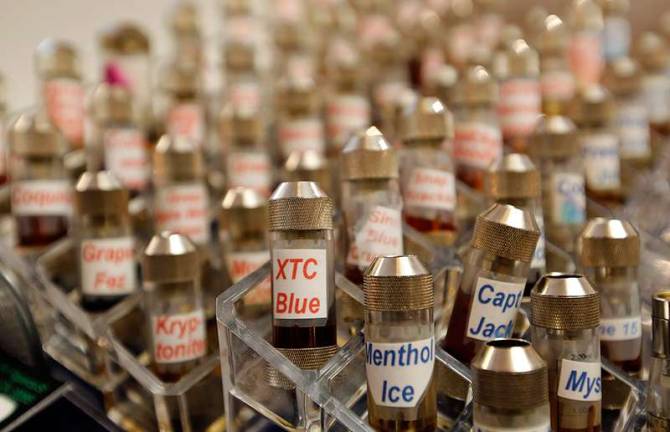Vaping enthusiasts opposed to small businesses tax

By NATASHA LINDSTROM
PITTSBURGH (AP) — Vaping enthusiasts are pressuring state lawmakers to extinguish a hefty new tax on e-cigarette products they say already has spurred the shuttering of 60 small businesses across Pennsylvania.
“This whole vapor tax is crazy. It's really a disastrous public health policy and disastrous fiscal policy for the state," said Bill Godshall, executive director and founder of SmokeFree Pennsylvania, a Swissvale-based nonprofit that advocates anti-smoking policies and supports vaping as a way to quit smoking.
“They're (policymakers) basically saying we want to wipe out most of our brick-and-mortar vape stores and give their business to out-of-state online retailers."
The state Legislature is counting on $13.3 million in annual revenue from new taxes that took effect Oct. 8 on all products related to vaping — the use of battery-powered devices called vaporizers or e-cigarettes to inhale flavored, vaporized liquids containing varying levels of nicotine.
Opponents of the vaping tax and some economists question the revenue projection and say the tax could end up costing more than it's worth when taking into account negative economic impacts.
“Vaping is a relatively small bit of the market, and it's not a smart way to generate a large amount of revenue," said Antony Davies, an economics professor at Duquesne University who slams the vaping tax for coming off like “a handout for big pharma and big tobacco."
Starting this month, retailers must pay a 40 percent wholesale tax on all vaping-related products — including the vaporizing devices, the propylene glycol- or vegetable glycerin-based “juices" that fill them and the batteries used to operate them. Shops must pay by Dec. 30 a 40 percent “floor tax" on unsold inventory.
“A lot of them did fire sales to get rid of any inventory, others are kind of hanging on hope that the tax will be changed," said Gregory Conley, president of the American Vaping Association advocacy group. “Some have told me, `Look, if it doesn't change, well then . I'll just end up declaring bankruptcy."
Among early casualties: Fifth Ave. Vapor in New Kensington, whose store owner Rob Farr told the Tribune-Review in August that he planned to close because of the tax.
Godshall, 59, of Greenfield helped organize a few hundred vaping proponents who rallied last week at the state Capitol in Harrisburg to plead for changes. Proponents maintain that almost 20 percent of Pennsylvania's roughly 300 to 350 vape shops have closed in response to the tax. “We're hoping, we're pushing and urging," Godshall said, “but it's a huge uphill battle."
In an attempt “to stave off a massive loss of jobs," Lycoming County Republican state Rep. Jeff Wheeland authored a bill to replace the 40 percent wholesale tax on all vaping-related products with a 5-cent-per-milliliter retail tax on vapor liquid only.
“That would be a phenomenal help," said Ken Hunter, manager at UIS Vapes, which opened in 2013 has locations in Greensburg and Somerset. “With the 40 percent, prices have obviously gone up and that has been passed onto the consumer. It's not fair to us as the shop owners or the customers."
House Bill 2342 — which Wheeland modeled after laws in Louisiana and North Carolina — cleared the state House finance committee on an 18-4, bipartisan vote.
It's unclear how much traction the bill has to advance. House GOP spokesman Steve Miskin said leaders from both houses are contemplating which items to prioritize in coming weeks.
The e-cigarette tax was part of a broader package of tax increases spanning digital downloads, smokeless tobacco, roll-your-own tobacco and tobacco cigarettes negotiated this past summer to plug a nearly $2 billion deficit.
Gov. Tom Wolf spokesman Jeffrey Sheridan said it's “premature to comment" on the proposed e-cigarette tax swap.
“But this aspect of the budget agreement — that all sides agreed on — provides much-needed revenue that the commonwealth cannot afford to lose," Sheridan added.
“Meanwhile," argued Davies, “consumers who want to vape can easily get this stuff online, bypassing the tax entirely."
Revenue spokesman Kevin Hensil said that vendors selling products into Pennsylvania are required to charge the tax, and if they don't, consumers are on the hook to report and pay the tax to the state.
But if they do get caught, according to Hensil, “those evading the tax" could face up to a $10,000 fine and a year in prison.